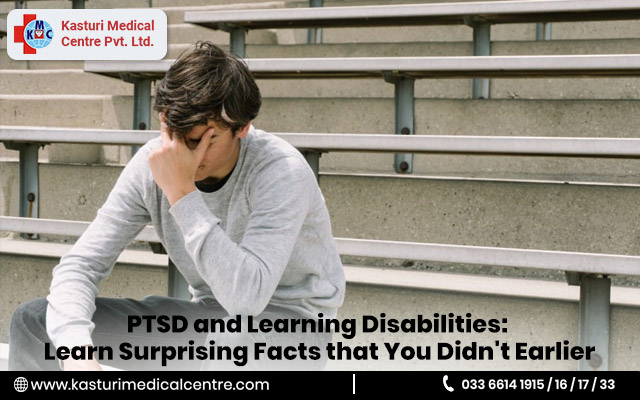Do you know that PTSD (Post-Traumatic Stress Disorder) and learning disabilities are interconnected in ways that can significantly affect people’s lives? Understanding these connections can shed light on how to support individuals suffering from this mental health condition. Expert doctors from Kasturi Medical Centre, who offer specialized services to treat this condition, are here to guide you. Read further to understand various treatments and why humanistic psychology treatment is ideal for patients.
Understanding PTSD
Post-Traumatic Stress Disorder is a medical condition that occurs in people who went through any such event that might have harmed them emotionally, mentally or physically. Any event like a natural disaster, the death of a close one, or witness of a heinous crime or sexual assault can be a significant factor. It directly impacts an individual’s brain, affecting their ability to focus, causing them to lose confidence, and many more.
Understanding learning disability
Learning disability refers to a group of neurological diseases that affect learning abilities. These diseases make it troublesome for people to understand new facts, learn, memorize, and perform various everyday tasks.
Types of learning disabilities
- Dyslexia- This is the most common disability, with difficulty processing language, speaking, listening, and writing. Due to this, their language and vocabulary develop at a slower pace compared to a healthy person.
- Dysgraphia– Dysgraphia makes it problematic to think and write simultaneously. People with dysgraphia are not able to arrange their thoughts while speaking or writing. Usually, people suffering from Dysgraphia have poor handwriting.
- Dyscalculia– This condition leads to difficulty with numbers and concepts. People with dyscalculia have problems performing math calculations, reading numbers, and counting money.
Symptoms
Some symptoms include
- Difficulty in paying attention
- Poor handwriting
- Difficulty with spelling and grammar
- Facing challenges while organizing thoughts on paper
- Difficulty in decoding words and understanding written text
- Challenges in applying maths concepts to problem-solving
Treatment
Treating PTSD (Post-Traumatic Stress Disorder) and learning disabilities involves a holistic approach that addresses both the psychological trauma and the specific learning challenges. Here are some common humanistic psychology treatments and strategies used:
Treating PTSD:
Psychotherapy (Cognitive Behavioral Therapy – CBT):
- Trauma-focused CBT: This approach helps individuals process traumatic memories and develop coping strategies to manage PTSD symptoms.
- Exposure therapy: Gradual exposure to trauma-related memories or situations in a safe environment can help reduce fear and anxiety.
- Cognitive restructuring: Addressing negative thought patterns and replacing them with healthier, more adaptive thoughts.
Eye Movement Desensitization and Reprocessing (EMDR):
- EMDR therapy involves focusing on traumatic memories while simultaneously stimulating bilateral eye movements or other forms of bilateral stimulation. This can help process traumatic memories and reduce distress.
Mindfulness and relaxation techniques:
- Practices such as meditation, deep breathing exercises and muscle relaxation techniques can help manage stress and anxiety symptoms.
By integrating these humanistic psychology treatments in their healing process, individuals with PTSD and learning disabilities can receive tailored support to manage symptoms, improve academic performance, and enhance their overall quality of life.

